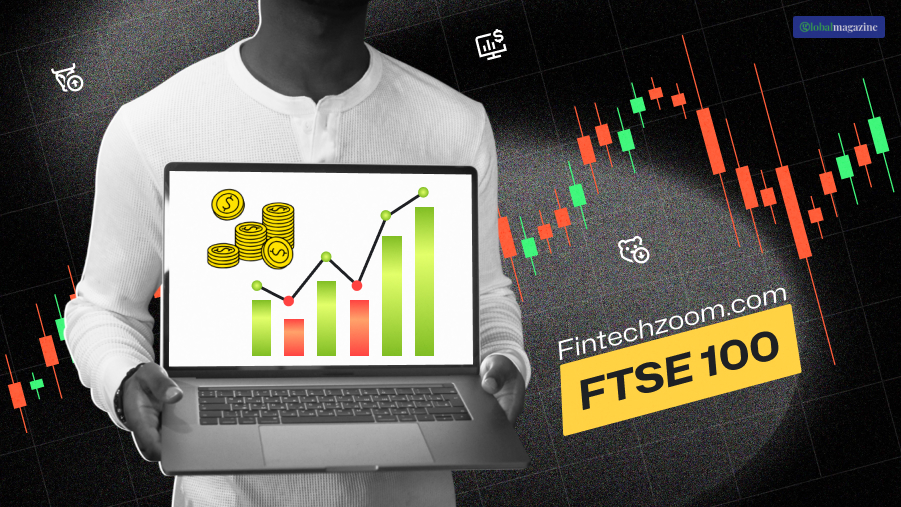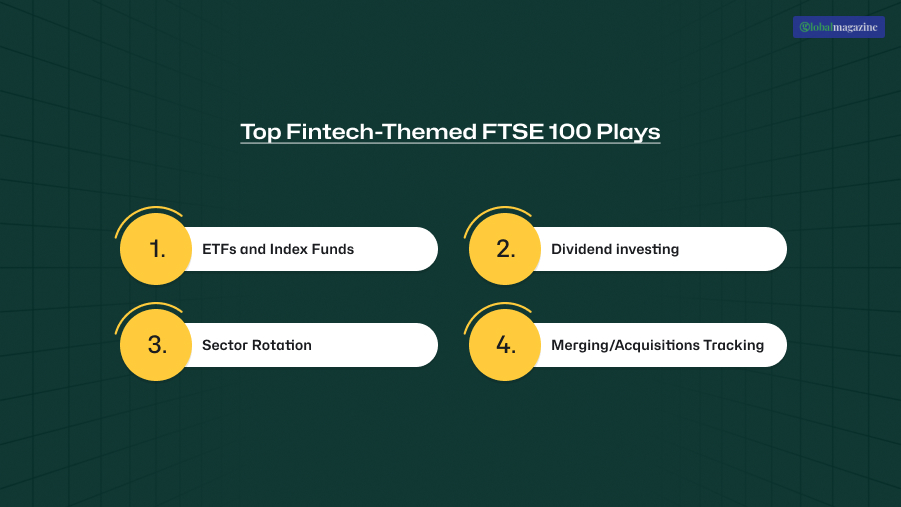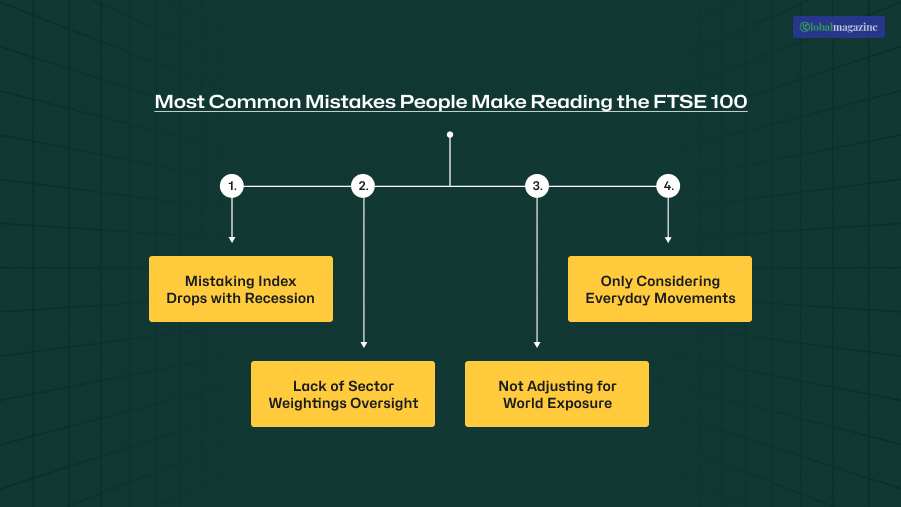FintechZoom.com FTSE 100: A Complete Guide To Learning The Index And Market Insights

Where tracking the well-being of Britain’s largest state-owned corporations is at issue, the FTSE 100 is most often used for that purpose.
Throw in expanding web influence from operators such as FintechZoom.com, and you have a dynamic spectacle in which novice and experienced investors alike may observe market trend, financial forecast, and technology-industry upheaval.
Whether you are new to long-term investment or a novice, this guide contains all there is to understand regarding the Fintechzoom.com FTSE 100’s Index, coverage, and their hands-on counsel for staying ahead of the competition.
Understanding The FTSE 100 Index

The FTSE 100 (Financial Times Stock Exchange 100) is the London Stock Exchange (LSE) 100 largest listed companies market-cap weighted index.
FTSE 100 was founded in 1984 and is occasionally regarded as a marker for the UK economy, while the majority of the constituent businesses are multinational.
Key Features:
- Comprises such high-profile global players as Unilever, BP, HSBC, Shell, and GlaxoSmithKline.
- The index is rebalanced quarterly in order to capture today’s world of finance.
- A broad sector spread: energy, financials, consumer goods, healthcare, and more recently, fintech and tech-specific companies.
The FTSE 100 isn’t price-weighted like the Dow Jones Industrial Average. Rather, it’s capitalization-weighted, wherein the bigger firms have a greater influence on the performance of the index.
The FintechZoom Impact On The FTSE 100
FintechZoom.com FTSE 100 is a worthwhile fintech news and analysis website, with a specific focus on fintech, crypto, stocks, and economic indicators. For the FTSE 100, FintechZoom offers:
- Real-time index movements and news of the day
- News on leading FTSE-listed firms
- Industry-focused analysis, special focus on fintech and financial services
- Expert views on economic indicators impacting the FTSE 100
By breaking down intricate financial news headlines and making data-driven predictions, FintechZoom enables ordinary investors to relish the intricacy of market trends—those of the UK’s mightiest firms, most especially.
Fintech Investing Strategies In The FTSE 100
The Fintechzoom.com FTSE 100 might be dominated by old-money finance and oil tycoons, but fintech-focused players are gaining traction.
While not quite tech-focused like the NASDAQ yet, players in financial service automation, digital banking, or payment technology are beginning to make themselves heard.
Top Fintech-Themed FTSE 100 Plays:

Buy and hold big financials like Barclays or Lloyds, which are heavily investing in digital banking.
- ETFs and Index Funds: Invest in FTSE 100 ESG or tech-skewed versions of ETFs.
- Dividend investing: FTSE 100 stocks have high dividend yields.
- Sector rotation: Invest by business cycle (e.g., fintech for the growth periods).
- Merging/Acquisitions tracking: Fintech buyout by FTSE heavy-hitters can trigger stock spikes.
FintechZoom provides strategy analysis and investor tips periodically to help users with these investment options.
How Frequently Does The FTSE 100 Change?
The FTSE 100 is revalued and updated quarterly—typically in March, June, September, and December. This ensures the index is always up to date so that it is fully populated with the largest 100 available UK companies by market cap.
Why Does An Index Update?
- Mergers or acquisitions
- Changes in share prices
- New IPOs joining the top 100
- Sectoral shift (e.g., growth of tech or ESG companies)
FintechZoom reorders daily with in-depth analysis of which stocks enter and leave, and its effect on investors.
Fintechzoom.com FTSE 100 Forecasts
FintechZoom provides predictive data of the FTSE 100 based on:
- Global economic trends
- UK-specific fiscal policy
- Company statements of earnings
- Inflation and interest rate figures
- Political instability or trade agreements
Sample Forecasts
- In 2023, FintechZoom correctly forecast FTSE volatility after Brexit trade agreements.
- In 2024, they forecasted technology-oriented shares such as RELX Group to outperform classic energy shares.
Their prediction processes are more dependent on AI-powered analytics, allowing for improved trend detection and alertness for investors.
How Is FTSE 100 Different From Other Indexes?
| Index | Region | Key Focus | Weighting Systems |
| FTSE 100 | UK | The top UK-listed companies | Market capitalization |
| S&P 500 | USA | 500 large US companies | Market capitalization |
| NASDAQ | USA | US technology-based companies | Market capitalization |
| DAX | Germany | Leading 40 German companies | Market capitalization |
| Nikkei 225 | Japan | Large Japanese corporations | Price-weighted |
While the FTSE 100 is more sector-focused than the NASDAQ, it is still more internationally exposed than the S&P 500, which reflects its global enterprises.
This implies that currency fluctuations, commodity prices, and geopolitical risks can impact FTSE performance more.
FintechZoom Tips For Beginner Investors
FintechZoom continually publishes beginner investor-friendly investment articles with tips such as:
- Invest in FTSE ETFs first to keep risk minimal and obtain index exposure.
- Avoid chasing highs—invest when the market is falling and during correction.
- Verify FTSE companies’ accounts before investing.
- Diversify beyond FTSE only—also consider global and sectoral ETFs.
- Pay attention to FintechZoom alerts and newsletters for news.
They also stress patience, asking new investors to look to long-term gains rather than short-term flutters.
Most Common Mistakes People Make Reading The FTSE 100

Learning how to read the price action of FTSE 100 is important. Typical investor errors include:
- Mistaking index drops with recession: Not all drops constitute a recession.
- Lack of sector weightings oversight: Financials, mining, and energy have uneven weightings.
- Not adjusting for world exposure: The majority of FTSE 100 companies generate the majority of their revenues outside the UK.
- Only considering everyday movements: Considering the longer term reveals more egregious trends and patterns.
FintechZoom’s charts and long-term charts demonstrate these points.
Is The FTSE 100 Only For The Rich?
Far from it. The FTSE 100 is accessible to ordinary investors via:
- Fractional shares
- ETFs like iShares FTSE 100 ETF (ISF)
- Index-tracking mutual funds
- Robo-advisors and eToro or Revolut-style apps
FintechZoom tends to remind everyone that even £50–£100/month of FTSE-tracking funds can offer decent long-term returns with compounding.
Does The FTSE 100 Reflect The Genuine Economy?
Yes and no.
- Yes, to the extent that it is a reflection of investor sentiment, profitability of companies, and macroeconomic health.
- No, in the sense that it’s not reflective of small businesses and the UK’s wider employment market.
The overrepresentation by the FTSE 100 of overseas revenues also has the consequence that it will respond differently to the UK economy—increasing even when UK domestic GDP declines.
FintechZoom recommends taking a look at FTSE 100 in conjunction with other gauges like the FTSE 250, inflation rates, and unemployment statistics to gain the complete picture.
How To Stay Updated Daily?
Here’s how to track the FTSE 100 properly:
- Read FintechZoom’s Markets Section: Daily market commentary, FTSE index reports, and expert commentaries.
- Set Google Alerts for “FTSE 100”.
- Download FTSE apps like LSE.co.uk, Yahoo Finance, or Bloomberg.
- Watch FintechZoom’s video briefings or get email newsletters for the quick summary.
No need to worry about staying in touch. 5 minutes a day is enough.
Top 5 Top Days In FTSE 100 History
| Date | Reason | Index Surge |
| Oct 13, 2008 | World synchronized interest rate reductions | +8.26% |
| Mat 24, 2020 | COVID stimulus crash hope | +9.05% |
| Apr 6, 2020 | Oil recovery and technological boom | +5.82% |
| Jun 1, 2020 | Economic reopening reports | +3.89% |
| Nov 9, 2020 | Pfizer vaccine announcement | +4.67% |
Top 5 Worst Days In FTSE 100 History
| Date | Reason | Index Drop |
| Mar 12, 2020 | COVID-19 panic sell-off | -10.87% |
| Oct 10, 2008 | Peak fears of financial crisis | -8.85% |
| Sep 11, 2001 | 9/11 terrorist attacks | -5.72% |
| Jun 24, 2016 | Brexit referendum outcome | -3.15% |
| Mar 9, 2020 | Oil price war and fear of virus | -7.69% |
What Impacts FTSE 100 Most?
There are a number of sector and macroeconomic drivers that impact FTSE 100:
- Currencies (GBP/USD): A falling pound will support FTSE, as the vast majority of constituents have revenues derived from everywhere across the globe.
- Commodity prices: BP, Shell, and Rio Tinto are affected by oil and metals.
- Interest rates: BoE policy has the potential to turn investor sentiment on its head in haste.
- Global trade tensions: Multinational exposure geopolitically makes FTSE exposed.
- Economic releases and inflation: Retail sales, factory data, and consumer sentiment drive the index.
FintechZoom tracks these drivers closely via real-time updates and economic calendars.
Final Thoughts
The Fintechzoom.com FTSE 100 remains a cornerstone of global investing, and FintechZoom.com provides one of the most accessible and insightful platforms for tracking it.
Whether you’re a new investor looking for beginner tips or a seasoned trader evaluating historical patterns, FintechZoom offers timely data, intelligent analysis, and clear strategies tailored to today’s markets.
Is the FTSE 100 worth a look? Yes. And with websites such as FintechZoom, you’ve never had it simpler making informed choices—be your portfolio big or small.

























